TPO6托福口语答案示例
托福口语第6题模板(坚果整理)
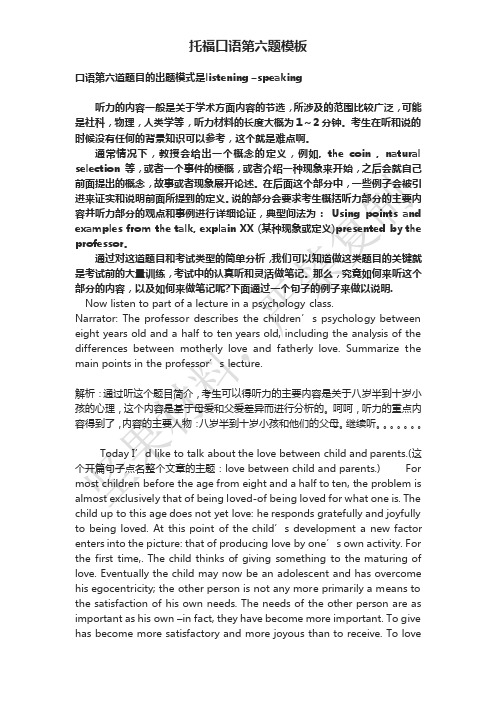
托福口语第六题模板口语第六道题目的出题模式是listening –speaking听力的内容一般是关于学术方面内容的节选,所涉及的范围比较广泛,可能是社科,物理,人类学等,听力材料的长度大概为1~2分钟。
考生在听和说的时候没有任何的背景知识可以参考,这个就是难点啊。
通常情况下,教授会给出一个概念的定义,例如, the coin , natural selection 等,或者一个事件的梗概,或者介绍一种现象来开始,之后会就自己前面提出的概念,故事或者现象展开论述。
在后面这个部分中,一些例子会被引进来证实和说明前面所提到的定义。
说的部分会要求考生概括听力部分的主要内容并听力部分的观点和事例进行详细论证,典型问法为:Using points and examples from the talk, explain XX (某种现象或定义)presented by the professor。
通过对这道题目和考试类型的简单分析,我们可以知道做这类题目的关键就是考试前的大量训练,考试中的认真听和灵活做笔记。
那么,究竟如何来听这个部分的内容,以及如何来做笔记呢?下面通过一个句子的例子来做以说明. Now listen to part of a lecture in a psychology class. Narrator: The professor describes the children’s psychology between eight years old and a half to ten years old, including the analysis of the differences between motherly love and fatherly love. Summarize the main points in the professor’s lecture. 解析:通过听这个题目简介,考生可以得听力的主要内容是关于八岁半到十岁小孩的心理,这个内容是基于母爱和父爱差异而进行分析的。
【必备资料】TPO6口语Task4题目文本及答案解析

【必备资料】TPO6口语Task4题目文本及答案解析在托福口语备考中,想要快速提升自己的托福口语能力,除了不断的累积自己的词汇和句型之外,从TPO练习入手也不失为一个不错的方法。
那么,在以下内容我们就为大家带来托福口语TPO的题目和答案解析。
托福TPO6口语task4题目 Reading Part:Explicit Memories and Implicit MemoriesIn everyday life, when people speak of memory, they are almost alwaysspeaking about what psychologists would call explicit memories. An explicitmemory is a conscious or intentional recollection, usually of facts, names,events, or other things that a person can state or declare. There is anotherkind of memory that is not conscious. Memories of this kind are called implicitmemories. An individual can have an experience that he or she cannot consciouslyrecall yet still display reactions that indicate the experience has been somehowrecorded in his or her brain.托福TPO6口语task4题目 Listening Part:Now listen to part of a lecture on this topic in a psychology class.(male professor) OK, um, the first kind of memory, we’re all very familiarwith this, right? You probably remember what you had for dinner last night. Youhave a conscious memory of last night’s dinner so, um, if I ask you what did you eat last night, you could tell me.But these other kinds of memories, implicit memories, they work differently. Let’s take an example from the world of advertising. When you are driving along a highway, you see plenty of billboards, you know, road side advertisements. You certainly don’t remember them all, but they still affect you. Marketing researchers have shown, well to be specific, let’s say there’s a billboard on the highway advertising, uh, a car called the Panther. The ad shows a bigpicture of the car and above the car, in huge letters, is the name of the car, Panther. A lot of people drive by the billboard, but ask those drivers later if they saw any advertisements for cars, and well, they’ll think about it and a lot of them will say no. They honestly don’t remember seeing any. They have no conscious memory of the Panther billboard.So, you ask these same people a different question. You ask, um, OK, you ask them to name an animal starting with a letter P. What do you think they’ll answer? Do they say Pig? Pig is the most common animal that starts with theletter P. But they don’t say Pig. They say Panther! The billboard had an effect,even though the drivers don’t remember ever seeing it.托福TPO6口语task4题目 Question:Using the example of the car advertisement, explain what is meant by implicit memory.托福TPO6口语task4答案解析:1. Reading key(1.1) Term: Implicit Memory(1.2) Definition: the kind of memory that is not conscious2. Listening key(2.1) Example: details on billboard(2.1.1) People driving on highway, sees billboard for car ad(2.1.2) The ad has a picture of the car being promoted and above the car is the name of the car “panther”(2.1.3) Ask those who drive by later, they can’t remember seeing a car ad (2.1.4) Ask them to name an animal with the letter “p”(2.1.5) They say “pig” instead of “panther” although “pig” more commonly known(2.1.6) They remembered “panther” unconsciously托福TPO6口语task4范文:In the lecture, the professor mainly talks about implicit memory which isthat sometimes we can remember things without even realizing it. For example,when people see a car ad on the billboard, they can unconsciously rememberdetails in the ad. Say the car in the ad is called panther, people can’tremember that they’ve seen a car ad on the highway, or anything has to do with panther. But interestingly, when they are asked to name an animal whose namestarts with a “p”, they’ll say “panther” instead of “pig” which is more commonly known. The billboard had an effect even though the drivers aren’t aware ofit.本文部分信息来源于新东方在线。
托福口语Task6 模板及高分答案
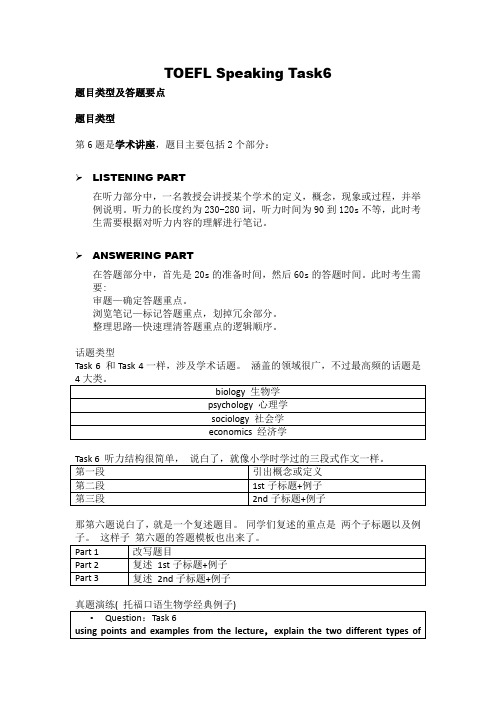
TOEFL Speaking Task6
题目类型及答题要点
题目类型
第6题是学术讲座,题目主要包括2个部分:
➢LISTENING PART
在听力部分中,一名教授会讲授某个学术的定义,概念,现象或过程,并举例说明。
听力的长度约为230-280词,听力时间为90到120s不等,此时考生需要根据对听力内容的理解进行笔记。
➢ANSWERING PART
在答题部分中,首先是20s的准备时间,然后60s的答题时间。
此时考生需要:
审题—确定答题重点。
浏览笔记—标记答题重点,划掉冗余部分。
整理思路—快速理清答题重点的逻辑顺序。
话题类型
Task 6 和Task 4一样,涉及学术话题。
涵盖的领域很广,不过最高频的话题是
那第六题说白了,就是一个复述题目。
同学们复述的重点是两个子标题以及例
从参考答案中,大家可以看出来第一句话改写题目是多么容易操作!Frontier前沿教育Esther 老师托福口语独家资料qq:397862712。
如何拿下托福口语第六题
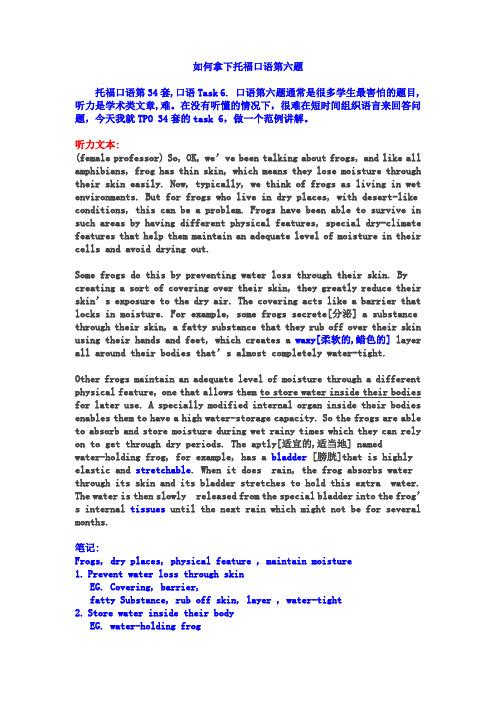
如何拿下托福口语第六题托福口语第34套,口语Task 6. 口语第六题通常是很多学生最害怕的题目,听力是学术类文章,难。
在没有听懂的情况下,很难在短时间组织语言来回答问题,今天我就TPO 34套的task 6,做一个范例讲解。
听力文本:(female professor) So, OK, we’ve been talking about frogs, and like all amphibians, frog has thin skin, which means they lose moisture through their skin easily. Now, typically, we think of frogs as living in wet environments. But for frogs who live in dry places, with desert-like conditions, this can be a problem. Frogs have been able to survive in such areas by having different physical features, special dry-climate features that help them maintain an adequate level of moisture in their cells and avoid drying out.Some frogs do this by preventing water loss through their skin. By creating a sort of covering over their skin, they greatly reduce their skin’s exposure to the dry air. The covering acts like a barrier that locks in moisture. For example, some frogs secrete[分泌] a substance through their skin, a fatty substance that they rub off over their skin using their hands and feet, which creates a waxy[柔软的,蜡色的] layer all around their bodies that’s almost completely water-tight.Other frogs maintain an adequate level of moisture through a different physical feature, one that allows them to store water inside their bodies for later use. A specially modified internal organ inside their bodies enables them to have a high water-storage capacity. So the frogs are able to absorb and store moisture during wet rainy times which they can rely on to get through dry periods. The aptly[适宜的,适当地] namedwater-holding frog, for example, has a bladder [膀胱]that is highly elastic and stretchable. When it does rain, the frog absorbs water through its skin and its bladder stretches to hold this extra water. The water is then slowly released from the special bladder into the frog’s internal tissues until the next rain which might not be for several months.笔记:Frogs, dry places, physical feature , maintain moisture1.Prevent water loss through skinEG. Covering, barrier,fatty Substance, rub off skin, layer , water-tight2.Store water inside their bodyEG. water-holding frogRain, absorb water through skin ,bladder stretches to hold water托福口语task6, 文章结构:Topic sentence: Frogs, dry places, physical feature , maintain moisture Sub topic 1position :Prevent water loss through skinExample :covering, barrier,fatty Substance, rub off skin,waxy layer , water-tightSub topic 2position:Store water inside their bodyExample : water-holding frogRain, absorb water through skin ,bladder stretches to hold waterSample Answer:The lecture introduced two dry-climate features of frogs.The first feature prevents water loss through their skin. Their skin can secrete a fatty substance, which they can rub all over their body using their hands and feet. And this waxy layer makes their skin watertight so as to reduce water loss.And other feature is modified internal organs that ensures higher water storage within their body. Frogs can absorb rain water through their skin,and store the water in their elastic bladder, so later the water can be released to their tissue to help the animal go for a long time. (8 sentences,104 words)。
托福TPO6口语Task5加task6题目文本及参考答案
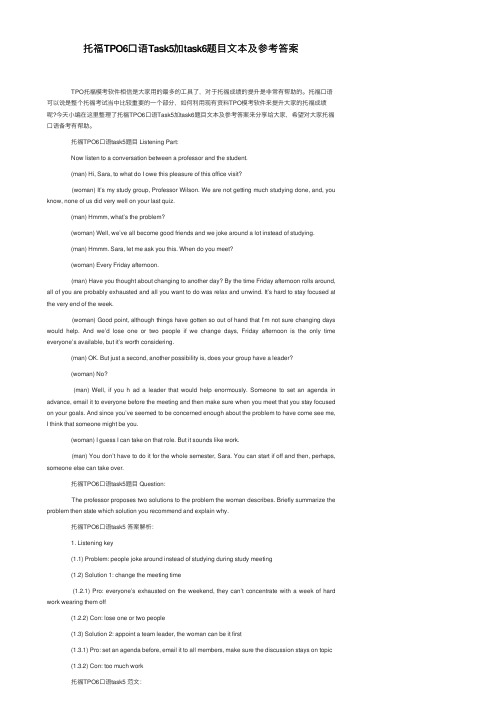
托福TPO6⼝语Task5加task6题⽬⽂本及参考答案 TPO托福模考软件相信是⼤家⽤的最多的⼯具了,对于托福成绩的提升是⾮常有帮助的。
托福⼝语可以说是整个托福考试当中⽐较重要的⼀个部分,如何利⽤现有资料TPO模考软件来提升⼤家的托福成绩呢?今天⼩编在这⾥整理了托福TPO6⼝语Task5加task6题⽬⽂本及参考答案来分享给⼤家,希望对⼤家托福⼝语备考有帮助。
托福TPO6⼝语task5题⽬ Listening Part: Now listen to a conversation between a professor and the student. (man) Hi, Sara, to what do I owe this pleasure of this office visit? (woman) It’s my study group, Professor Wilson. We are not getting much studying done, and, you know, none of us did very well on your last quiz. (man) Hmmm, what’s the problem? (woman) Well, we’ve all become good friends and we joke around a lot instead of studying. (man) Hmmm. Sara, let me ask you this. When do you meet? (woman) Every Friday afternoon. (man) Have you thought about changing to another day? By the time Friday afternoon rolls around, all of you are probably exhausted and all you want to do was relax and unwind. It’s hard to stay focused at the very end of the week. (woman) Good point, although things have gotten so out of hand that I’m not sure changing days would help. And we’d lose one or two people if we change days, Friday afternoon is the only time everyone’s available, but it’s worth considering. (man) OK. But just a second, another possibility is, does your group have a leader? (woman) No? (man) Well, if you h ad a leader that would help enormously. Someone to set an agenda in advance, email it to everyone before the meeting and then make sure when you meet that you stay focused on your goals. And since you’ve seemed to be concerned enough about the problem to have come see me, I think that someone might be you. (woman) I guess I can take on that role. But it sounds like work. (man) You don’t have to do it for the whole semester, Sara. You can start if off and then, perhaps, someone else can take over. 托福TPO6⼝语task5题⽬ Question: The professor proposes two solutions to the problem the woman describes. Briefly summarize the problem then state which solution you recommend and explain why. 托福TPO6⼝语task5 答案解析: 1. Listening key (1.1) Problem: people joke around instead of studying during study meeting (1.2) Solution 1: change the meeting time (1.2.1) Pro: everyone’s exhausted on the weekend, they can’t concentrate with a week of hard work wearing them off (1.2.2) Con: lose one or two people (1.3) Solution 2: appoint a team leader, the woman can be it first (1.3.1) Pro: set an agenda before, email it to all members, make sure the discussion stays on topic (1.3.2) Con: too much work 托福TPO6⼝语task5 范⽂: The woman’s problem is that everyone jokes around and talks a lot during study meetings instead of studying. She’s got two possible solutions, the first is to change the study meeting from Friday afternoon to some other time. The second solution is to appoint a leader to the group. I think it’d better if she bite the bullet and take on the role of leader. First of all, it is very important for everyone to study during a study meeting or it’s a waste of time. The presence of a leader can keep the discussion on topic. Second, she mentions that Friday night is when everyone is free to meet, so changing the meeting schedule would mess things up for many group members. 托福TPO6⼝语task6题⽬ Listening Part: Now listen to part of a talk in an Education class. (female professor) One of the hardest parts of teaching is keeping your students’ attention. Now, the key to doing this is understanding the concept of attention. Basically, there are two types of attention. The first type is active, active attention is voluntary. It’s when you intentionally make yourself focus on something. And since it requires effort, it’s hard to keep up for long a time. OK, so, um, let’s say you are teaching a Biology class. And today’s topic is frogs. All right? You’re standing in front of the room lecturing: a frog is a type of animal known as an amphibian…, well, this isn’t necessarily going to keep the students’ interest. But most of them will force themselves to pay active attention to your lecture. But it’s only a matter of time before they get distracted. Now, the other type of attention is passive attention, when it’s involuntary. Passive attention requires no effort because it happens naturally. If something is really interesting students don’t have to force themselves to pay attention to it. They do it without even thinking about it. So back to our Biology lecture, you start talking about frogs and then you pull a live frog out of your briefcase. You’re describing it while holding it up. Show the students how long its legs are, and how they’re used for jumping, for example. Then maybe even let the frog jump around a bit on the desk or the floor. In this case, by doing something unexpected, something more engaging, you can tap into their passive attention. And it can last much longer than active attention. As long as the frog is still there your students will be interested. 托福TPO6⼝语task6题⽬ Question: Using points and examples from the talk, explain the difference between active and passive attention. 托福TPO6⼝语task6 答案解析: 1. Listening key (1.1) Main idea: active and passive attention (1.2) Active attention: forced (1.2.1) Example: (1.2.1.1) A teacher teaches a class by only reading from textbooks (1.2.1.2) Students will get bored, yet they’d still try to focus (1.2.1.3) But they will get distracted soon because this attention is forced (1.3) Passive attention: happens naturally (1.3.1) Example: (1.3.1.1) A teacher teaches with a live frog, let it jump around a bit (1.3.1.2) Students get interested in what’s happening, their concentration happens naturally (1.3.1.3) As long as the frog is on the table, students will have no problem focusing on the lecture 托福TPO6⼝语task6 范⽂: The professor talks about two kinds of attention in the lecture. The first type is active attention which is voluntary. For example, if a biology teacher teaches a class by only reading from a textbook, the class can become fairly boring. Most students would force themselves to focus, but sooner or later, the students will be distracted. The second type of attention is passive attention, let’s say instead of reading from a textbook, the teacher pulls a live frog out of his bag, then the lecture becomes really interesting. As long as the frog is on the table, the students will be able to focus on the lecture.。
tpo口语 参考答案
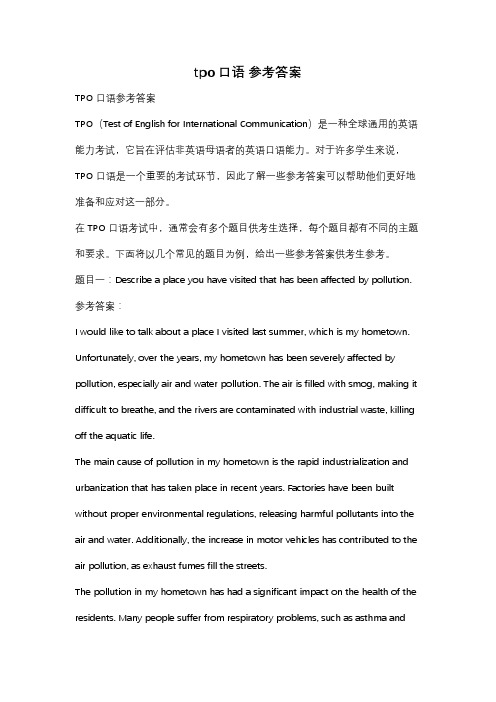
tpo口语参考答案TPO口语参考答案TPO(Test of English for International Communication)是一种全球通用的英语能力考试,它旨在评估非英语母语者的英语口语能力。
对于许多学生来说,TPO口语是一个重要的考试环节,因此了解一些参考答案可以帮助他们更好地准备和应对这一部分。
在TPO口语考试中,通常会有多个题目供考生选择,每个题目都有不同的主题和要求。
下面将以几个常见的题目为例,给出一些参考答案供考生参考。
题目一:Describe a place you have visited that has been affected by pollution. 参考答案:I would like to talk about a place I visited last summer, which is my hometown. Unfortunately, over the years, my hometown has been severely affected by pollution, especially air and water pollution. The air is filled with smog, making it difficult to breathe, and the rivers are contaminated with industrial waste, killing off the aquatic life.The main cause of pollution in my hometown is the rapid industrialization and urbanization that has taken place in recent years. Factories have been built without proper environmental regulations, releasing harmful pollutants into the air and water. Additionally, the increase in motor vehicles has contributed to the air pollution, as exhaust fumes fill the streets.The pollution in my hometown has had a significant impact on the health of the residents. Many people suffer from respiratory problems, such as asthma andbronchitis, due to the poor air quality. The contaminated water has also led to an increase in waterborne diseases.To tackle this issue, the government needs to take immediate action. Stricter regulations should be implemented to control industrial pollution, and more efforts should be made to promote renewable energy sources. Furthermore, public transportation should be improved to reduce the number of private vehicles on the road.In conclusion, pollution has had a detrimental effect on my hometown. It is crucial for the government and the community to work together to address this issue and create a cleaner and healthier environment for future generations.题目二:Talk about a memorable event from your childhood.参考答案:One of the most memorable events from my childhood was my first trip to Disneyland. I was about seven years old at the time, and it was a dream come true for me. The moment I stepped into the park, I was overwhelmed with excitement and wonder.I vividly remember the colorful characters walking around, the thrilling rides, and the delicious food. It felt like I had entered a magical world where anything was possible. I spent the entire day exploring the different attractions and going on as many rides as I could.One particular ride that stood out to me was the roller coaster. I was initially scared to go on it, but my older brother convinced me to give it a try. As theroller coaster went up and down, I screamed with a mix of fear and exhilaration. It was an adrenaline rush like no other, and I couldn't stop laughing afterwards. Another highlight of the trip was meeting my favorite Disney princess, Cinderella.I waited in line for what felt like hours just to get a picture with her. When it was finally my turn, I was starstruck. Cinderella was so kind and beautiful, and I felt like I was meeting a real-life princess.Overall, my first trip to Disneyland was an unforgettable experience. It was a day filled with joy, laughter, and magic. Even now, as an adult, I still cherish the memories from that day and hope to visit Disneyland again in the future.通过以上两个例子,我们可以看到在TPO口语考试中,要求考生描述一个地方或者一个事件,并且给出个人观点或者建议。
【必备资料】托福TPO6口语Task6题目文本及答案解析
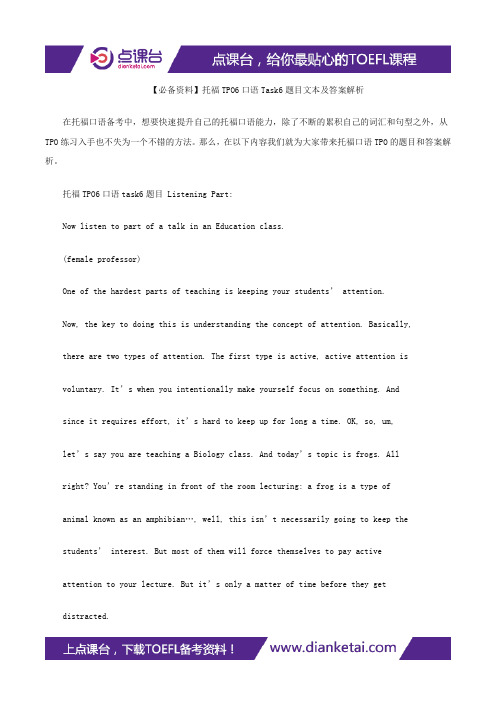
【必备资料】托福TPO6口语Task6题目文本及答案解析在托福口语备考中,想要快速提升自己的托福口语能力,除了不断的累积自己的词汇和句型之外,从TPO练习入手也不失为一个不错的方法。
那么,在以下内容我们就为大家带来托福口语TPO的题目和答案解析。
托福TPO6口语task6题目 Listening Part:Now listen to part of a talk in an Education class.(female professor)One of the hardest parts of teaching is keeping your students’ attention.Now, the key to doing this is understanding the concept of attention. Basically,there are two types of attention. The first type is active, active attention isvoluntary. It’s when you intentionally make yourself focus on something. Andsince it requires effort, it’s hard to keep up for long a time. OK, so, um,let’s say you are teaching a Biology class. And today’s topic is frogs. Allright? You’re standing in front of the room lecturing: a frog is a type ofanimal known as an amphibian…, well, this isn’t necessarily going to keep thestudents’ interest. But most of them will force themselves to pay activeattention to your lecture. But it’s only a matter of time before they getdistracted.Now, the other type of attention is passive attention, when it’s involuntary. Passive attention requires no effort because it happens naturally. If something is really interesting students don’t have to force themselves to pay attention to it. They do it without even thinking about it. So back to our Biologylecture, you start talking about frogs and then you pull a live frog out of your briefcase. You’re describing it while holding it up. Show the students how long its legs are, and how they’re used for jumping, for example. Then maybe even let the frog jump around a bit on the desk or the floor. In this case, by doing something unexpected, something more engaging, you can tap into their passive attention. And it can last much longer than active attention. As long as thefrog is still there your students will be interested.托福TPO6口语task6题目 Question:Using points and examples from the talk, explain the difference betweenactive and passive attention.托福TPO6口语task6 答案解析:1. Listening key(1.1) Main idea: active and passive attention(1.2) Active attention: forced(1.2.1) Example:(1.2.1.1) A teacher teaches a class by only reading from textbooks(1.2.1.2) Students will get bored, yet they’d still try to focus(1.2.1.3) But they will get distracted soon because this attention isforced(1.3) Passive attention: happens naturally(1.3.1) Example:(1.3.1.1) A teacher teaches with a live frog, let it jump around a bit(1.3.1.2) Students get interested in what’s happening, their concentration happens naturally(1.3.1.3) As long as the frog is on the table, students will have no problem focusing on the lecture托福TPO6口语task6 范文:The professor talks about two kinds of attention in the lecture. The first type is active attention which is voluntary. For example, if a biology teacher teaches a class by only reading from a textbook, the class can become fairlyboring. Most students would force themselves to focus, but sooner or later, the students will be distracted. The second type of attention is passive attention, let’s say instead of reading from a textbook, the teacher pulls a live frog out of his bag, then the lecture becomes really interesting. As long as the frog is on the table, the students will be able to focus on the lecture.本文部分信息来源于新东方在线。
2019年TPO6托福口语Task3原文及参考答案
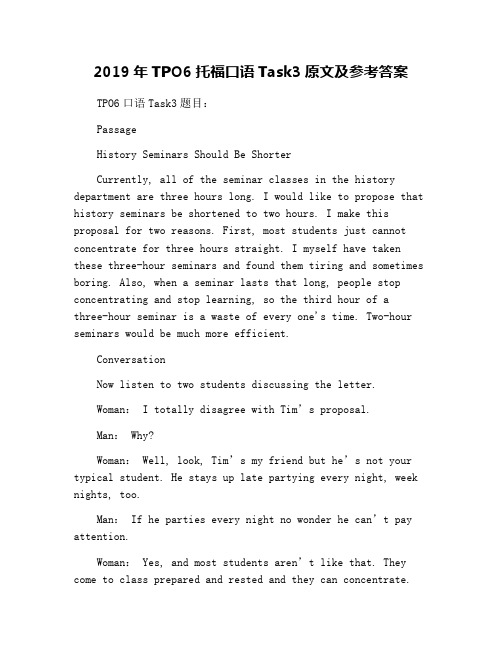
2019年TPO6托福口语Task3原文及参考答案TPO6口语Task3题目:PassageHistory Seminars Should Be ShorterCurrently, all of the seminar classes in the history department are three hours long. I would like to propose that history seminars be shortened to two hours. I make this proposal for two reasons. First, most students just cannot concentrate for three hours straight. I myself have taken these three-hour seminars and found them tiring and sometimes boring. Also, when a seminar lasts that long, people stop concentrating and stop learning, so the third hour of athree-hour seminar is a waste of every one's time. Two-hour seminars would be much more efficient.ConversationNow listen to two students discussing the letter.Woman:I totally disagree with Tim’s proposal.Man: Why?Woman:Well, look, Tim’s my friend but he’s not your typical student. He stays up late partying every night, week nights, too.Man:If he parties every night no wonder he can’t pay attention.Woman:Yes, and most students aren’t like that. They come to class prepared and rested and they can concentrate.Man:So, you’re sa ying that problem is really Tim.Woman: Yes. He was in one of my classes last year and whenever I looked at him he was actually sleeping.Man:I guess if he was sleeping, he can’t really know what’s happening, what other people in class are doing.Woman: Right! And you want to know what does happen in that last hour of seminar? In a lot of seminars that I’ve been in, that’s when things get interesting.Man: Really?Woman:Yes, that’s usually when students get really involved in the discussion and start ex changing important ideas, and if the History department actually did what Tim suggests, well if they did that, what would happen is you’d lose what might be the most worthwhile part of the seminar.QuestionThe woman expresses her opinion about the proposal that her friend Tim made in his letter to the newspaper. State her opinion about his proposal and explain the reason she gives for her opinion.Key Points1. cannot concentrate; tiring & boring2. stop learning; third hr a waste of timeTPO6口语Task3参考答案(范文模板):The woman doesn’t agree with Tim’s proposal to shorten the history seminars to two hours, instead of three.According to Tim, most students can’t concentrate that long and the seminars are wearing, but the woman says the reason why Tim can’t concentrate is cos he parties all night long and gets sleepy in the class. Most students aren’tlike him. Concentration is not a problem for them. Tim also notes since people stop learning during the third hour, the last hour is a waste of time for everyone, but the woman points out the last hour is actually the best part of the seminar cos it was during that time that the students are actively involved in the discussion and start comparing notes. If you miss it,it’s a huge loss.。
- 1、下载文档前请自行甄别文档内容的完整性,平台不提供额外的编辑、内容补充、找答案等附加服务。
- 2、"仅部分预览"的文档,不可在线预览部分如存在完整性等问题,可反馈申请退款(可完整预览的文档不适用该条件!)。
- 3、如文档侵犯您的权益,请联系客服反馈,我们会尽快为您处理(人工客服工作时间:9:00-18:30)。
TPO6托福口语答案示例文章摘要:为帮助各位考生攻克托福口语,乐闻携尔网托福频道将持续更新TPO中托福口语部分的答案,其内容全部来自《新托福真题详解——口语分卷》。
新动态乐闻携尔留学(粉丝1.5万)6—1请介绍你曾经见过且印象深刻的一张照片或者一幅绘画,并说明你是否喜欢它及其理由。
response 1 by nativeOne painting I have seen that I found memorable was a painting called “Nighthawks.” This painting shows people sitting around at a diner on a late night sometime in the 1930s. I found the painting memorable because it reminded me of many things we learned about in history class, such as the Great Depression, Prohibition in the 1920s, and gangsters like Al Capone. I find that period of history very interesting, and the painting seems to contain many elements of that period in one place.response 2 by non-nativeThe most memorable photo I have ever seen is a photo of Mount Everest. The beauty of it was breathtaking. The snow was so pure and the sky was crystal clear. I could not help but wonder what it would be like to be on the top of that mountain and to see everything from up there. Since the first time I laid my eyes on that gorgeous photo, I know, I cannot get it out of my mind or even out of my life. And I have always dreamt of climbing to its very top. I know to conquer it would be a tremendous undertaking that would require bravery and lots of climbing practice. But the mountain is just there, like a calling, and I would like to challenge myself and fight for it.6—2有些人一生只从事一份工作,而有些人在不同的人生阶段会从事不同的工作。
你认为哪种生活方式比较好?请解释原因。
response 1 by nativeI believe that having one career for most of one’s life is betterthan having different kinds of work at different points in life. Changing careers bring a lot of uncertainty along with it. Between the time gaps ofthe two different jobs, will you have income? Will you be able to support your family? I believe that keeping one type of career is more stableand will always provide money to buy food and necessities for your family. Keeping one type of job is safer, and this is better for supporting a family. response 2 by non-nativeI prefer to do different kinds of work at different points in my life. For all of us, we only live once and it is more productive and interesting to try different vocations. If we just have one career throughout our lives without having a try in other fields we may find our whole life wasted on something that we are not good at or most interested in. So we need to explore different fields before we finally make up our mind to devote our lives to one career. 6—3阅读材料:应缩短历史研讨会的时长目前,历史系所有研讨会的时长都是3个小时。
基于两点原因,我建议历史研讨会应该缩短至2个小时。
首先,大部分学生无法坚持在3个小时内持续集中注意力。
我亲自参加这些 3 小时研讨会时,发现长时会议很容易让人感到疲劳而且有时候很无聊。
其次,一个研讨会持续太久,人们便会因无法集中注意力而不再继续获取知识,所以一个3小时研讨会中的第 3 个小时实际上是在浪费每一个与会者的时间,而2小时研讨会的效率应该会更高。
题目:对话中的女生阐述了她对于朋友 Tim 给报社写信的内容的看法。
请陈述她对Tim 的提议的看法以及她所给出的理由。
response 1 by nativeTim is proposing to the school newspaper that the three-hour history seminar the university offers should be shortened to only two hours; however, this woman disagrees strongly. The woman gives a few reasons for her opposition to his opinion. For one, she knows that Tim goes out and parties a lot almost every day of the week, and so he sleeps during class. He wants the class to be shorter because he only gets tired during class. Also, she says that a lot of the best conversation in the seminar occurs in the last hour. During that time all of the students exchange their ideas, and if the seminar is shortened, they will lose the most worthwhile part. response 2 by non-nativeA student, Tim, suggests that the history seminar should be shortened from three hours to two hours, because he thinks that most students cannot concentrate for three hours straight. Also, students would stop learning during the third hour so it would be a big waste of time for everyone. The woman in the listening material strongly disagrees with the proposal because she thinks that it is Tim’s own problem. Hestays up partying every night and thus he cannot concentrate but everyone else is well rested and prepared for the class, so that three-hour class won’t be a problem. Furthermore, in the third hour, students get the chance to exchange their ideas and have a heated discussion, which is the time when the history seminar gets really interesting.6—4阅读材料:外显记忆与内隐记忆在日常生活中,当人们谈及记忆的时候,大多指的是心理学家所谓的外显记忆。
外显记忆是一种有意识的或者有意的回忆,通常是一些事实、姓名、事件或者其他可以被人们陈述或说明的事物。
还有另外一种无意识的记忆,称为内隐记忆。
人们常常会有这种经历,他 / 她无法主动回忆起相关的细节,却依然可以做出一些相关的反应,这表示这个经历已经以某种方式在他的脑海中留下烙印了。
题目:请用汽车广告的例子来解释内隐记忆的含义。
response 1 by nativeWhile the things we know as memories are things we remember, these are only explicit memories. In fact, we also have implicit memories, or memories that we cannot remember automatically but exist nonetheless, and our brains show evidence that we have experienced or seen them. In the example, the professor describes a highway billboard that has a picture of a car with the word “panther ”above it. If you ask someone whether he or she saw the billboard, he or she might not clearly remember it and say no. However, if you ask the same person to name an animal that begins with a“p”, he or she would almost certainly say“panther”. While he or she doesn’t remember the billboard explicitly, the word“panther”sticks in the person’s mind implicitly.response 2 by non-nativeThe reading passage mainly talks about two types of memory: explicit and implicit memory. First, explicit memory is conscious or intentional recollection. The second type, implicit memory, means that people can record an experience without realizing they are able to recall it. The professor illustrates it through an example. If there is a billboard on the highway displaying a big picture of a car with its name “panther”in huge letters, it would be visible to people driving by. But if you ask them later whether they remember an advertisement about a car called panther, they won’t remember a thing. But if you ask them to name an animal starting with the letter “p”, they are more likely to give the name “panther” instead of “pig”, which is the more common animal beginning with the letter “p”. Evidently, thebillboard has an effect even though the drivers don’t remember ever seeing it. 6—5在对话中,教授针对这个女生所描述的问题给出了两点建议。
